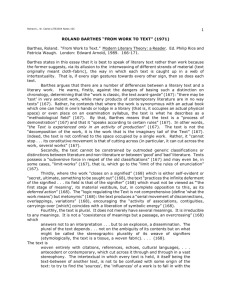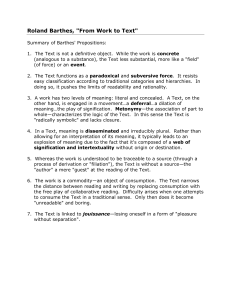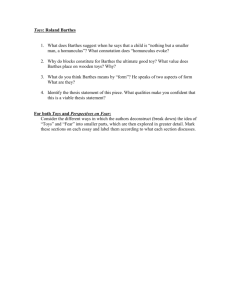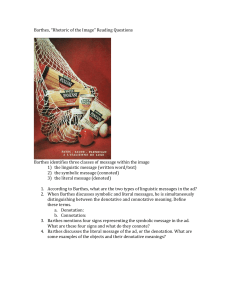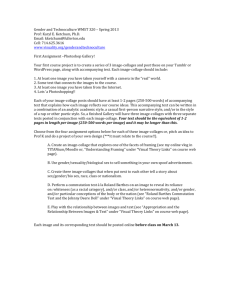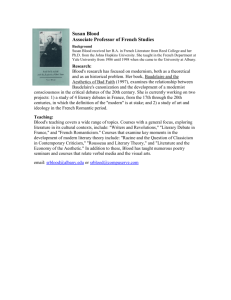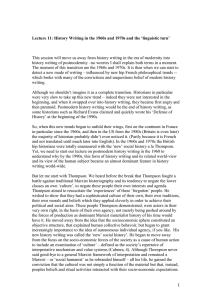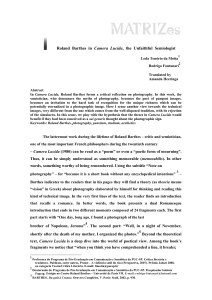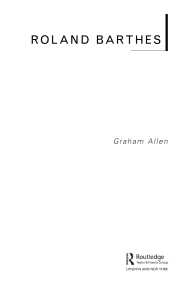Microsoft Word document
advertisement
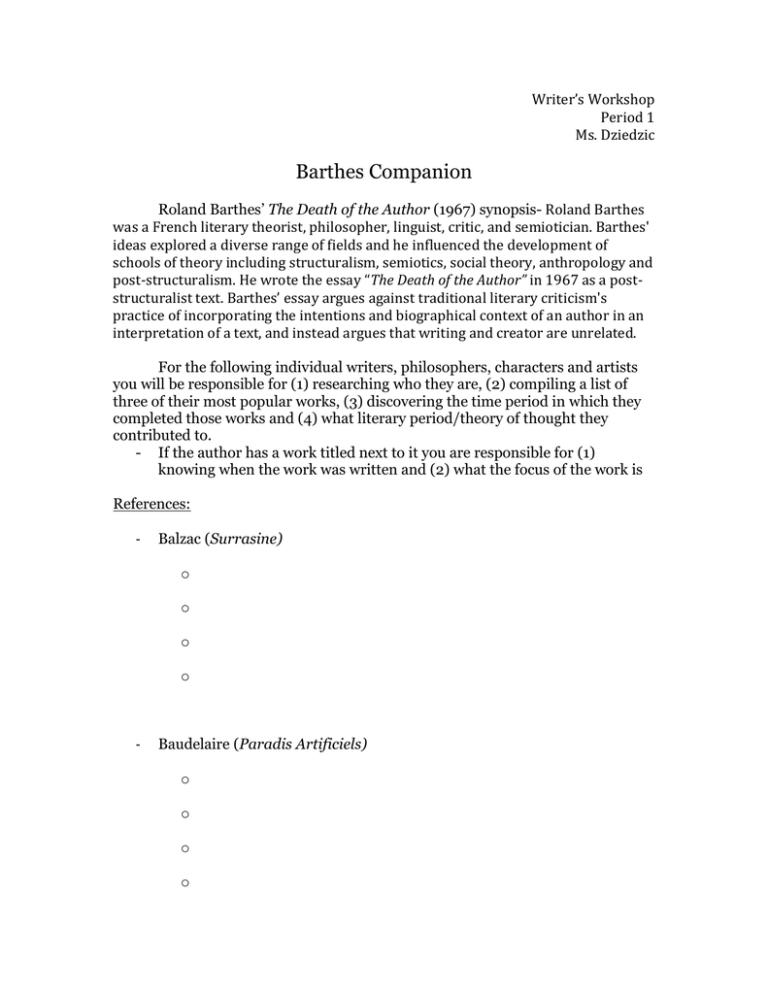
Writer’s Workshop Period 1 Ms. Dziedzic Barthes Companion Roland Barthes’ The Death of the Author (1967) synopsis- Roland Barthes was a French literary theorist, philosopher, linguist, critic, and semiotician. Barthes' ideas explored a diverse range of fields and he influenced the development of schools of theory including structuralism, semiotics, social theory, anthropology and post-structuralism. He wrote the essay “The Death of the Author” in 1967 as a poststructuralist text. Barthes’ essay argues against traditional literary criticism's practice of incorporating the intentions and biographical context of an author in an interpretation of a text, and instead argues that writing and creator are unrelated. For the following individual writers, philosophers, characters and artists you will be responsible for (1) researching who they are, (2) compiling a list of three of their most popular works, (3) discovering the time period in which they completed those works and (4) what literary period/theory of thought they contributed to. - If the author has a work titled next to it you are responsible for (1) knowing when the work was written and (2) what the focus of the work is References: - Balzac (Surrasine) o o o o - Baudelaire (Paradis Artificiels) o o o o - Van Gogh o o o o - Tchaikovsky o o o o - Stéphane Mallarmé o o o o - Marcel Proust o o o o - Charles-Louis, Baron de Montesquieu o o o o - Bertolt Brecht o o o o - Thomas de Quincey o o o o - Jean-Pierre Vernant o o o o Concepts: I have provided the following definitions and important ideologies of the literary and social concepts mentioned in Barthes’ piece. These will help you get to the bottom of Barthes’ focus and not get tangled in his allusions. - English empiricism o A theory of knowledge in which knowledge is obtained through sensory experiences and evidence; learning from what one sees, feels, hears, and etc. o John Locke was a leading philosopher in British empiricism o “Knowledge is based on experience” - French rationalism o Important figures: François-Marie Voltaire, Jean Jacques Rousseau, and Charles de Secondat, (baron de Montesquieu) o A philosophy which deals in intellectual and deductive reasoning and believes reality can be explained through mathematical calculations and logical principles - Reformation o The reforming of the church after Henry VIII broke from Rome to establish the Church of England in the 16th century - Capitalist ideology o Competitive economic system in which industries are owned by private businesses which set prices and regulations for market economies o Focus remains on the power of an individual business’s gain rather than the productivity of the industry - Rhetoric o The art of effective or persuasive speaking or writing, while utilizing the use of figures of speech and other compositional techniques. - Modernity o Post- traditional historic period o Charles Baudelaire is credited with coining the term "modernity" to describe the experience of life in an urban metropolis, and the responsibility art has to capture that experience. o Surrealism Cultural movement in the 1920’s often described as a revolutionary movement featuring elements of surprise, unexpected juxtapositions of dreams and reality - Hypostases (Literature) o A literary moment when characters in fiction become aware of their own fictional nature o Hypostasis (linguistic) example: “I'm tired of your ifs and buts.” The usage meaning of the word is referred to as a whole. - Intertextuality o Using another text to make meaning of a different text - Anti-theological o Opposing theology; theology being the study of God and the truthfulness of religion - Humanism o A philosophical and ethical stance that focuses on the important of human beings, as individuals and as a species; preferring critical thinking/evidence above doctrine/faith - Antiphrastical Recriminations o Antiphrasis- the ironic or humorous use of words in senses opposite to the generally accepted meanings example: “this giant of 3 feet 4 inches” o Recrimination or accusation in an antiphrasisical manner would be a backhanded ironic statement meant to undermine the recipient Vocabulary 1. Castrato 2. Femininity 3. Romantic psychology 4. Composite 5. Oblique 6. Intransitively 7. Ethnographic 8. Positivism 9. Allegory 10. Prerequisite 11. Impersonality 12. Encumbered 13. Ego 14. Linguistic 15. Militated 16. Recourse 17. Inexorably 18. Subtilization 19. Historical reality 20. Subversion 21. Illusory 22. Desacrilization 23. Enunciation 24. Interlocutors 25. Veritable 26. Antecedence/ predicate 27. Theological 28. Innumerable centres 29. Anterior 30. Exemplary 31. Hypostases 32. Multiplicity 33. Posits 34. Systemic 35. Constitutively ambiguous 36. Unilaterally 37. Dialogue, parody, contestation 38. Hitherto 39. Derisory 40. Antiphrastically recrimination
